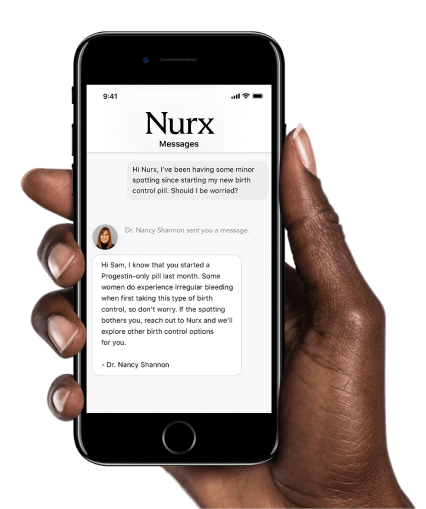Affordable
Affordable out of pocket pricing
Hydroquinone† brightens dark spots caused by melasma by treating discoloration at its source.*
Treatment requires an online consultation with a Nurx medical provider. Medication cost may vary based on prescribed treatment for your individual needs. Medications shipped and billed quarterly. Price not guaranteed; additional costs apply, including consultation and support fee.


in hyperpigmentation or dark spots after 8 weeks*

Consistency is key to maximizing the effectiveness of your melasma treatment.
Drug factsApply twice a day (we recommend applying after you wash your face in the morning and at night).
Before sun exposure, apply sunscreen as hydroquinone† can make skin more sensitive to the sun.
It’s recommended that you do not use hydroquinone for more than 3 months at a time.
Complete our online medical consultation, which asks questions about your health history and skin concerns.
After evaluating your consultation, a provider licensed in your state will prescribe treatment (if clinically appropriate).
We’ll send a 3-month supply to your doorstep and check in with you to see how it’s working. Pause or cancel anytime.

online expert-level care
Nurx patients served

Affordable out of pocket pricing
Free shipping & pause or cancel anytime
Providers help you find the right treatment
Unlimited messaging for any questions, anytime

Peter Young, MD is the Medical Director for Nurx’s Dermatology specialty. Dr. Young is a board-certified dermatologist who advises the Nurx medical team on how to provide the highest quality of care for dermatology conditions through telehealth.
†Hydroquinone 4%, Rx only, is indicated for hyperpigmentation associated with melasma. Hydroquinone may cause side effects, including skin peeling, flaking and irritation. If you would like to learn more about Hydroquinone, please see the full prescription information, here. You are encouraged to report negative side effects of prescription drugs to the FDA. Visit MedWatch: HTTPS://WWW.FDA.GOV/SAFETY/MEDWATCH /default.htm or call 1-800-FDA-1088.
*Individual results may vary.
‡The information provided here is not a substitute for professional medical advice, diagnosis, or treatment. You should not rely upon the content provided here for specific medical advice. If you have any questions or concerns, please talk to your provider.
◊Services not offered in every state. Medications prescribed only if clinically appropriate, based on completion of the required consultation.
At Nurx, we make it easy to get the expert healthcare you deserve. From schedules to health history, everybody is different—so we provide treatment and care that’s personalized to you. Through life’s cycles, changes, and transitions, we’re here to help you make informed choices about your health.
